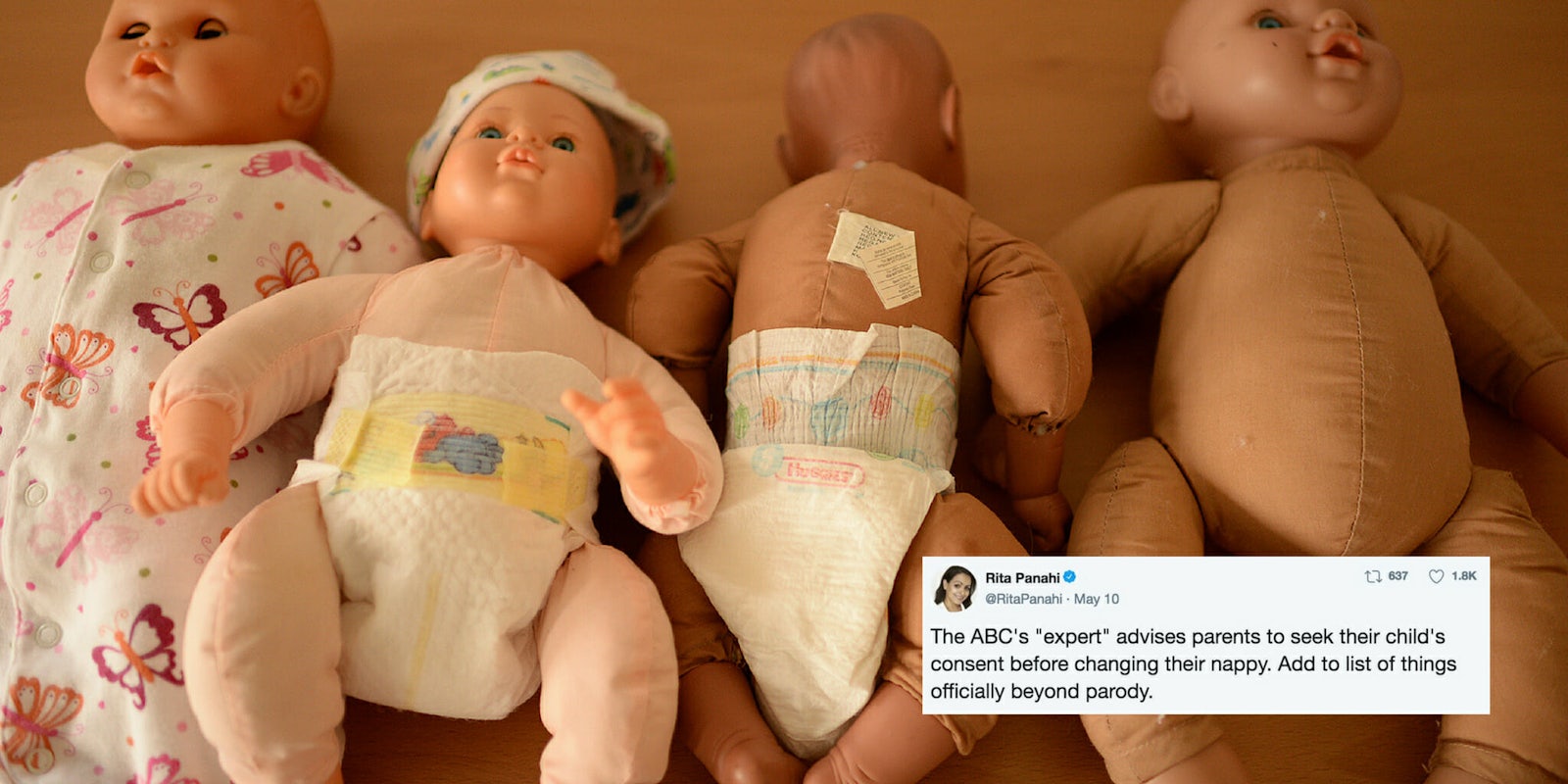If you ask a baby for consent to change its dirty diaper, and it has no idea what you’re saying, will the internet take this suggestion and ridicule it across social media platforms? Without a doubt, yes.
Twitter is lambasting this suggestion from Deanne Carson, an Australia-based sexuality expert who went on the Australian Broadcasting Corporation and told parents to work on teaching consent to babies when at the changing table.
Carson said parents could say to their babies, “I’m going to change your nappy [diaper] now, is that OK?”
“Of course a baby’s not going to respond, ‘Yes, mom, that’s awesome, I’d love to have my nappy changed.’ But if you leave a space and wait for body language and wait to make eye contact, then you’re letting that child know that their response matters,” Carson went on.
https://twitter.com/RaheemKassam/status/994595882401239041
The concept of teaching children about consent when it comes to touching and being touched isn’t what people latched onto. Instead, the internet has gone after Carson’s point of attempting to communicate with a baby who is unable to form sentences for several years.
The ABC’s “expert” advises parents to seek their child’s consent before changing their nappy. Add to list of things officially beyond parody. https://t.co/wxvftPCx8r
— Rita Panahi (@RitaPanahi) May 10, 2018
https://twitter.com/gogreen18/status/994599842537132033
Babies can consent? I don’t like where this is headed.https://t.co/pM0pa0Cex9
— Stefan Molyneux, MA (@StefanMolyneux) May 11, 2018
So you believe babies can consent and that you have to gain their consent whenever you interact with them.
— Ian Miles Cheong (@stillgray) May 11, 2018
Scenario: Pop quiz, hot shot. Baby doesn’t want its diaper changed. What do you do? What. Do. You. Do? pic.twitter.com/SDCjCnk7Er
Some expressed that asking a baby for consent to change its diaper, even if they understood, might have a negative effect on its understanding of consent. If the baby were to not want that done, is it fair to follow the child’s wishes and keep them in a dirty diaper? And if a parent were to go ahead and change the diaper anyway, wouldn’t that show the child that their consent doesn’t matter?
Parent: hey newborn can I change your diaper?
— Erin (@3RINN) May 10, 2018
Baby: (no response)
Parent: well I’m going to do it anyway. #ThursdayThoughts #lifewithkids https://t.co/hX9idQrEyJ
https://twitter.com/benpobjie/status/994810837838761985
https://twitter.com/ProducerKen/status/994876677053468672
Others questioned if Carson had any childcare experience of her own.
https://twitter.com/emily_zinos/status/994656533886758913
And then some took Carson’s comments a bit too far. Australian journalist Joe Hildebrand asserted that Carson equated her goal to teach children about consent with rape, calling it a disservice to survivors of sexual assault. However, teaching children about general consent early on is valuable in moving forward to talk about asking for and giving sexual consent and developing sexual boundaries later in life.
“This is the sort of thing that actually destroys the good things that are achieved through movements…” @Joe_Hildebrand slams the suggestion that parents need to seek a baby’s consent before changing a nappy. #Studio10 pic.twitter.com/IuCyjhAiIk
— Studio 10 (@Studio10au) May 11, 2018
Saw this.
— Nick O (@nicknamesnuts) May 11, 2018
First reaction: Nappy consent. What?
Second thought: Oh, people are calling it left lunacy.
Third thought: She’s really just talking about how one might start conversations about consent early on in life.
Fourth thought: We all need to take a breath before reacting. pic.twitter.com/T2CeFj915W
It means we let the child know their opinion is important and we don’t strip them naked without letting them know what is happening to their body.
— Blossom (@KittenFlower) May 11, 2018
Another video from August featuring Carson’s teachings about consent does mention parents working with their own children as babies, but primarily shows children 3-4 years old learning about bodily autonomy and expressing when they do and don’t give consent.
The class doesn’t teach children about sex, but instead gets them in touch with their feelings and emotions, which Carson said could be overruled when adults want them to do the polite thing such as kiss or hug a family member they don’t want to.
Jumpstarting a culture of consent in a child’s life is far from a bad idea. However, Carson might want to emphasize how different “getting consent” from a baby might be from just communicating to them what’s happening when they’re having their diaper changed.


